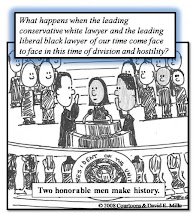
The NY Times is reporting today that the U.S. Supreme Court will hear its big strip search case on April 21. The High Court will review a lower court ruling that school officials violated the constitutional rights of a 13-year-old Arizona girl when they strip searched her based on a classmate’s uncorroborated accusation that she possessed ibuprofen. I theenk theese case is an outrageous abuse of school district powers.
The matter, Redding v. Safford Unified School District, was appealed from the U.S. Court of Appeals for the Ninth Circuit, which found the strip search to be unconstitutional. A six-judge majority of the appeals court further held that the school official who ordered the search is not entitled to immunity as a result of his actions.
The matter, Redding v. Safford Unified School District, was appealed from the U.S. Court of Appeals for the Ninth Circuit, which found the strip search to be unconstitutional. A six-judge majority of the appeals court further held that the school official who ordered the search is not entitled to immunity as a result of his actions.
Savana Redding, an eighth grade honor roll student at Safford Middle School in Safford, Arizona, was pulled from class on October 8, 2003 by the school’s vice principal, Kerry Wilson. Earlier that day, Wilson had discovered prescription-strength ibuprofen - 400 milligram pills equivalent to two over-the-counter ibuprofen pills, such as Advil - in the possession of Redding’s classmate.
Under questioning and faced with punishment, the classmate claimed that Redding had given her the pills. 2003? By now, she could have graduated college and found a teaching job.
In the school nurse’s office, Redding was ordered to strip to her underwear. She was then commanded to pull her bra out and to the side, exposing her breasts, and to pull her underwear out at the crotch, exposing her pelvic area. The strip search failed to uncover any ibuprofen pills.
This is galling. The strip search was undertaken based solely on the uncorroborated claims of the classmate facing punishment. No attempt was made to corroborate the classmate’s accusations among other students or teachers. No physical evidence suggested that Redding might be in possession of ibuprofen pills or that she was concealing them in her undergarments. Furthermore, the classmate had not claimed that Redding currently possessed any pills, nor had the classmate given any indication as to where they might be concealed. No attempt was made to contact Redding’s parents prior to conducting the strip search. The Supreme Court does not normally uphold a lot of what they do out here in the Ninth Circuit, my second home. This case should be the exception.
Additional information on the case, including that ACLU’s legal filings and the full Ninth Circuit Court of Appeals ruling, is available at: www.aclu.org/drugpolicy/search/35964prs20080711.html
Today's NY Times article
































No comments:
Post a Comment